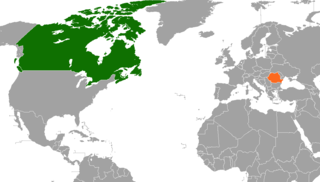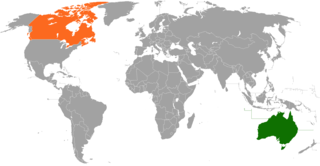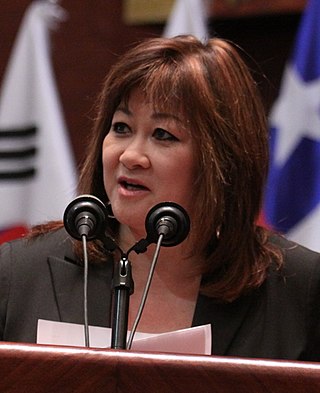Related Research Articles
Bilateralism is the conduct of political, economic, or cultural relations between two sovereign states. It is in contrast to unilateralism or multilateralism, which is activity by a single state or jointly by multiple states, respectively. When states recognize one another as sovereign states and agree to diplomatic relations, they create a bilateral relationship. States with bilateral ties will exchange diplomatic agents such as ambassadors to facilitate dialogues and cooperations.

James Bezan is a Conservative Canadian politician who has represented the riding of Selkirk—Interlake—Eastman in the House of Commons of Canada since 2004. He is currently the Conservative Shadow Minister for National Defence.

James Gordon Carr was a Canadian politician, cabinet minister, journalist, and professional oboist. A member of the Liberal Party, he served as the member of Parliament for Winnipeg South Centre from 2015 until his death on December 12, 2022. Carr died days after his Private Members Bill, Bill C-235, An Act respecting the building of a green economy in the Prairies, passed the House and went to the Senate. He last served as the Chair of the Standing Committee on Public Safety and National Security, until his resignation on September 29, 2022.

Donald Neil Plett is a Canadian senator who has been the leader of the Opposition in the Canadian Senate since November 5, 2019. He is the founding president of the National Council of the Conservative Party of Canada, and the longest serving individual to have held this position.

The Committee on International Trade (INTA) is a committee of the European Parliament. Its current chair, elected on 10 July 2019, is Bernd Lange. INTA is responsible for matters relating to the establishment, implementation and monitoring of the EU’s common commercial policy and its external economic relations, including trade and investment legislation, bilateral, plurilateral and multilateral agreements and relations with the World Trade Organisation (WTO). With the Treaty of Lisbon, the Parliament has become a co-legislator in the Union’s Common Commercial Policy and has the final say on entry into force of all trade agreements. Moreover, the Union competencies were expanded to include foreign investment.

Edward D. "Ed" Fast is a Canadian politician who has served as the member of Parliament (MP) for Abbotsford since 2006. A member of the Conservative Party of Canada, he was Minister for International Trade and Minister for the Asia–Pacific Gateway from 2011 to 2015 under Prime Minister Stephen Harper.

The China–Australia Free Trade Agreement (ChAFTA) is a bilateral free trade agreement (FTA) between the governments of Australia and China. Since negotiations began, 21 negotiating rounds have been completed. The deal was completed on 17 November 2014 and details released two days later, nearly 10 years after its first round of negotiations that began on 23 May 2005 after a joint feasibility study. The free trade agreement was signed between the two countries on 17 June 2015. Following the usual treaty making process the agreement came into force on 20 December 2015, after the Chinese Government completed its domestic legal and legislative processes and the Australian Parliament’s Joint Standing Committee on Treaties and the Senate Foreign Affairs, Defence and Trade References Committee finished a review.

Canada and Venezuela established full diplomatic relations in the early 1950s. Relations between the two countries have traditionally been on good terms; those relations however began to sour under Prime Ministers Stephen Harper and Justin Trudeau, in relation to the policies of Presidents Hugo Chávez and Nicolás Maduro. Canada has imposed targeted sanctions against 70 government officials in the Venezuelan Government.

Diplomatic relations between Canada and China officially date back to 1942, when Canada sent an ambassador to the Republic of China. Before then, Canada had been represented by the British ambassador. The Communist victory in the Chinese Civil War and subsequent proclamation of the People's Republic of China in 1949 resulted a break in relations that lasted until 1970, when Canadian Prime Minister Pierre Trudeau became one of the first Western leaders to recognize the People's Republic of China.

Canada and Romania have maintained bilateral relations since 1967. The two countries are members of OSCE, La Francophonie and NATO. Canada has an embassy in Bucharest, and Romania has an embassy in Ottawa and three consulates-general.

Australia and Canada have a longstanding relationship fostered by both countries' shared history and culture as well as the links between residents of the countries. The two countries are former British Dominions and have a common head of state in King Charles III. Both countries are members of the Asia-Pacific Economic Cooperation, Cairns Group, Commonwealth of Nations, Comprehensive and Progressive Agreement for Trans-Pacific Partnership, Five Eyes, OECD and the United Nations.

Diplomatic relations between Canada and Barbados date back to 1907, when the Government of Canada opened a Trade Commissioner Service to the Caribbean region located in Bridgetown, Barbados. Following Barbadian independence from the United Kingdom in November 1966, the Canadian High Commission was established in Bridgetown, Barbados on 27 September 1973. There is a High Commission of Barbados in Ottawa and a Barbadian Consulate in Toronto. The relationship between both nations today partly falls under the larger gambit of Canada–Caribbean relations. As of 2014 it is estimated that as much as 8% of Canadian foreign investments in Barbados.

Canada and Turkey have maintained diplomatic relations since 1943. Both countries are members of the G20, NATO, Organization for Economic Co-operation and Development, Organization for Security and Co-operation in Europe, United Nations and the World Trade Organization.

Diplomatic relations between Austria and Canada centres on the history of Austrian migration to Canada. Approximately 200,000 Canadians have Austrian ancestry. Both nations are members of the OECD and the United Nations.

The Comprehensive Economic and Trade Agreement is a free-trade agreement between Canada and the European Union and its member states. It has been provisionally applied, thus removing 98% of the preexisting tariffs between the two parts.

Wai Young is a Canadian politician from Vancouver, British Columbia. She represented the electoral district of Vancouver South for the Conservative Party of Canada from 2011 to 2015. She was elected to the House of Commons of Canada in the 2011 election, but was defeated by the Liberal Party candidate Harjit Sajjan in the 2015 election. She started her own municipal party, Coalition Vancouver, on June 21, 2018. She is leader of the party and ran as its mayoral candidate for the 2018 municipal election. She unsuccessfully contested the 2019 federal election.

The free trade agreements of Canada represents Canada's cooperation in multinational trade pacts and plays a large role in the Canadian economy. Canada is regularly described as a trading nation, considering its total trade is worth more than two-thirds of its GDP. Of that total trade, roughly 75% is done with countries that are part of free trade agreements with Canada—primarily the United States through the Canada–United States–Mexico Agreement (CUSMA), and its predecessor the North American Free Trade Agreement (NAFTA). By the end of 2014, Canada's bilateral trade hit Can$1 trillion for the first time. Canada is a signatory to 15 free trade agreements with 51 countries.

The 42nd Canadian Parliament was in session from December 3, 2015, to September 11, 2019, with the membership of its lower chamber, the House of Commons of Canada, having been determined by the results of the 2015 federal election held on October 19, 2015, and thirty new appointees to its Upper House, the Senate of Canada. Parliament officially resumed on December 3, 2015, with the election of a new Speaker, Geoff Regan, followed by a Speech from the Throne the following day. The Speaker of the Senate of Canada was George Furey, who was appointed Speaker of the Canadian Senate on the advice of Prime Minister Justin Trudeau, to replace Leo Housakos, on December 3, 2015. On September 11, 2019, Prime Minister Justin Trudeau advised Governor General Julie Payette to dissolve Parliament and issue the writ of election, leading to a five-week election campaign period for the 2019 federal election. Significant legislation adopted during the 42nd Parliament included the Cannabis Act, the Greenhouse Gas Pollution Pricing Act, the Comprehensive Economic and Trade Agreement Implementation Act, the Trans-Pacific Partnership Implementation Act, the Canada Infrastructure Bank Act, the Impact Assessment Act and Canadian Energy Regulator Acts, as well as the legalizing of medical assistance in dying and adding gender identity and expression to the list of prohibited grounds of discrimination in the Canadian Human Rights Act.

Diplomatic relations between Canada and Senegal began in 1962. Both nations are members of the Organisation internationale de la Francophonie.
The Canada-China Promotion and Reciprocal Protection of Investments Agreement or Canada China FIPA is a bilateral investment treaty between Canada and China which came into force on 1 October 2014. The Foreign Investment Protection Agreement (FIPA) or Foreign Investment Protection and Promotion Agreement (FIPPA) are Canadian names for BITs.
References
- "5 things to know about the Canada-China investment treaty", CBC News, 27 October 2012, retrieved 12 November 2014
- Lunn, Susan (12 September 2014), Canada-China investment treaty to come into force Oct. 1: Conservatives ratify foreign investment treaty more than 2 years after signing deal, CBC News, retrieved 12 November 2014
- Canada-China Bilateral Achievements, Press Release, Ottawa, Ontario, 11 January 2012, archived from the original on 5 October 2013, retrieved 12 November 2014
{{citation}}: CS1 maint: location missing publisher (link) - "Terms of Reference", Canada-China Legislative Association, Ottawa, ON: Parliament of Canada, nd, retrieved 12 November 2014
- "Executive Committee", Canada-China Legislative Association, Ottawa, ON: Parliament of Canada, nda, retrieved 12 November 2014